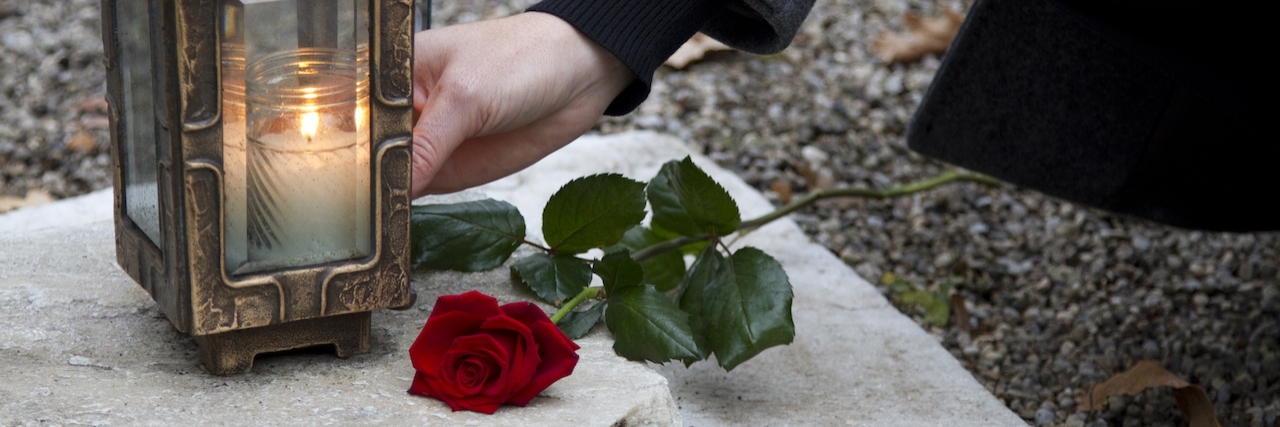She was very young when it finally claimed her life. It had gone undiagnosed and untreated for many years. Self-medication made it better some days. Some days, it made it worse. Finally, her family took her to a doctor for help, but it was too late. She was dead within the year.
It is very much the same for all of us, regardless of the illness. You play out the same scenarios. You walk the tightrope of hope, trying to maintain balance in the midst of the inescapable truth: You are powerless. Your insignificance in the mean face of death is overwhelming.
You hold their hand and fight your tears. You stay up late, sitting in the kitchen when you should be in bed. You jump at the phone. You mull over the details with friends. You question the doctor. Are they doing everything they can? Are they doing it right? Could someone else be doing more for them? You count your blessings. You count each day. Then, you count each minute. Before you know it, you’re holding your breath for each second.
When the seconds stop, the funeral is unremarkable. The pain so evenly distributed over every inch of your body that you can hardly feel a thing. The food there tastes like sand. If you have the energy to tune in to what anyone is saying, then it is unfathomably inconsequential. You can’t believe you spoke that way, some unimaginable amount of time ago. You are sure you will never speak that way again.
The sort of condolences bestowed on us, the grieving loved ones, are many and they are truly empathetic. Even after all this time, they are warm and heartfelt. It is this warmth that drives the lump into my throat, the inevitability that a perfectly well-meaning person will inquire about how it happened. The lump will bob and choke, while I explain to them that she killed herself.
I watch as the shift takes place: They furrow their brow and click their tongue, the same reaction from everyone. What had just a moment before been perceived as the tragedy of an innocent death becomes the report of an insidious crime. Suddenly the blame shifts, as if every death is a crime scene and the only one of us unaccountable is God.
In order to help those suffering from mental illnesses such as depression, we need to begin acknowledge that falling victim to a mental illness is as irreproachable as falling victim to any physical illness. Imagine marching into battle knowing in the event of your death, instead of being remembered for your bravery, you would be condemned in your failure to prevail. We need to understand these victims are not committing acts of violence against themselves on a whim. We need to recognize they go to battle every day, and each day that they are still standing is a victory.
We need to accept their realities are their own, and not shove our own realities down their throats. Those of us who choose to enrich our lives with the power of positive thinking, we need to understand it is chemically impossible for others to do the same. Would you ask a friend battling another illness to try harder? Would you suggest maybe they go get a hobby, get out more and enjoy the sunshine? Would you suggest these things might cure them? Would you ever make them feel they were somehow responsible for the ultimate outcome of their illness?
Suicidal thoughts are as real and as harmful as the cancerous cells that infiltrate our bodies and claim our lives. As is the case with cancer, there is a chance the victims of mental illness will respond well to treatment and learn to live again. On the other hand, like cancer, it can fight them until they lose all fighting strength. Whatever the illness, the bottom line is this: it may take our loved ones from us. They will often go violently. They will leave us with what feels like intent.
Don’t do your loved ones the injustice of believing this lie. Their illness has already robbed them of a life, but don’t let it taint their memory in death. We don’t want to apologize for them anymore. Some of us won’t because we feel they have nothing to apologize for. Some of us can’t because we can’t forgive them ourselves.
Please, stop asking us to apologize for them. Don’t ask us to remember them for their ultimate defeat. Allow us to remember them for each day we spent with them, each memory a lasting victory.
If you or someone you know needs help, visit our suicide prevention resources page.
If you need support right now, call the Suicide Prevention Lifeline at 1-800-273-8255. You can reach the Crisis Text Line by texting “START” to 741-741.

